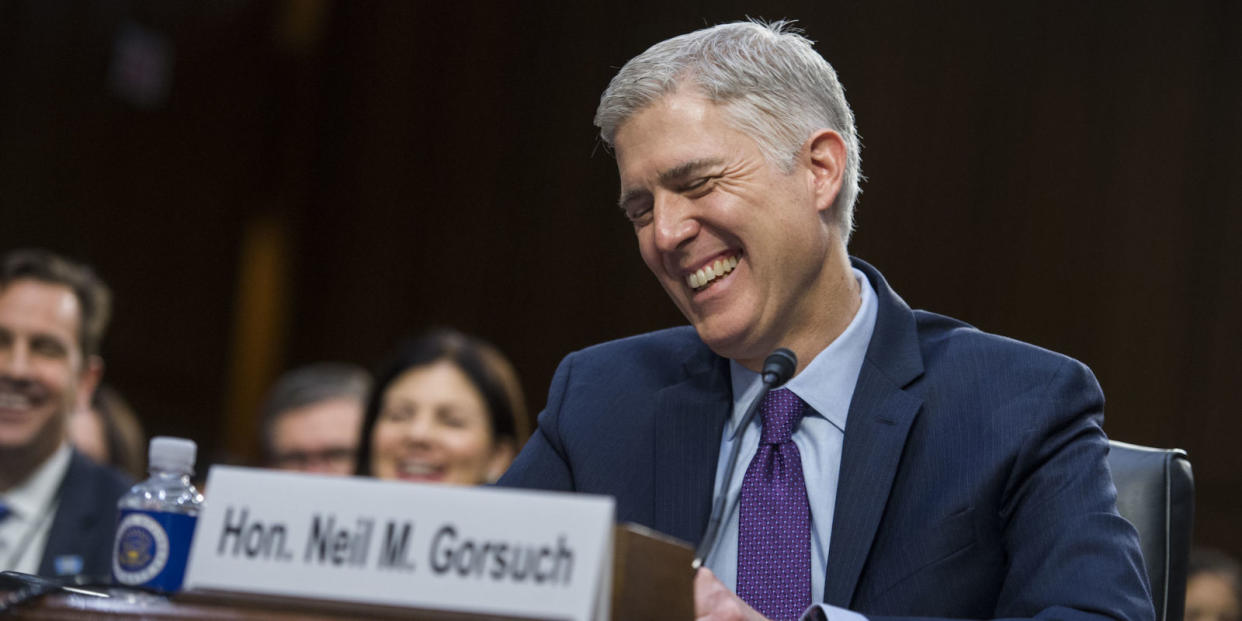Neil Gorsuch Isn't Worried About the $10 Million in Dark Money Backing His Confirmation

While most of the country was occupied by FBI Director James Comey's testimony that his agency was investigating the Trump campaign's ties to Russia, hearings got underway for the president's Supreme Court nominee, Neil Gorsuch. The proceedings continued today, and things got interesting when Democratic Senator Sheldon Whitehouse asked Gorsuch about a $10 million press and advertising campaign waged by an outside group to get him confirmed. The snag in the whole business is that the $10 million is dark money-its true sources are using 501(c)4 group Judicial Crisis Network to obscure themselves-so we don't know who exactly it is that's so eager to see Gorsuch on the bench.
Gorsuch, it seems, is less concerned than Whitehouse:
Whitehouse asks Gorsuch abt his nom. being pushed by $10MIL dollar dark $$ campaign.
Gorsuch: "It is what it is." https://t.co/kUHLxIZKkn pic.twitter.com/RiDu6ZBjMI- Kyle Griffin (@kylegriffin1) March 21, 2017
After a cute anecdote about Byron White, an associate justice appointed by President John F. Kennedy in 1962, Gorsuch got down to business. Admitting there's "a lot about the confirmation process today that [he regrets]," Gorsuch finished:
"The fact of the matter is, it is what it is. It's this body that makes the laws."
That's true: Congress has the power to try to outlaw dark money in politics. Except the reason that it's an issue at all is is the Supreme Court's 2010 Citizens United decision, which opened the system up to the unlimited flow of dark money like the $10 million supporting Gorsuch's confirmation effort. (The decision allowed 501[c]4s, or so-called "social welfare" nonprofits, to engage in political activity-including political spending-more actively. By law, they do not need to disclose their donors to the IRS. It also created Super PACs, which can spend unlimited sums on advertising and voter outreach not "coordinated" with a campaign. 501[c]4s can donate to SuperPACs.)
"The fact of the matter is, it is what it is."
Because the Supreme Court de facto instituted the policy through a ruling that went well beyond the McCain-Feingold Act at issue in the case, Congress would have to pass a constitutional amendment-which requires a two-thirds vote in Congress, and ratification by three-quarters of state legislatures-to overturn it. That is, to say the least, an unlikely scenario in the current political environment.
Gorsuch maintained this fantasy of the Supreme Court as an apolitical player throughout the proceedings, which Whitehouse earlier pressed him on with a question about Citizens United in particular. Did he really believe the judges were not involving themselves in politics through that decision?
Sen. Whitehouse: 'Do you really believe the Supreme Ct. that decided Citizens United was not involved in politics?' https://t.co/kUHLxIZKkn pic.twitter.com/RAj8iRBalT
- Kyle Griffin (@kylegriffin1) March 21, 2017
There was a similar song-and-dance routine when Republican Chuck Grassley, the committee chair, asked Gorsuch about the Bush v. Gore decision this morning. Gorsuch refused to offer any opinion on it, simply maintaining that the ruling was a "precedent."
Of course, that belies the fact that it was perhaps the most explicitly political decision in the history of the Court, in that by essentially putting a stop to recount efforts in Florida in a 5-4 decision, the justices were making George W. Bush president. (Legal scholars have also debated whether a line in the decision declares it cannot be used as precedent, further complicating Gorsuch's dodge here.) The nominee, whose credentials and acumen are not in question, surely knows this.
You Might Also Like

